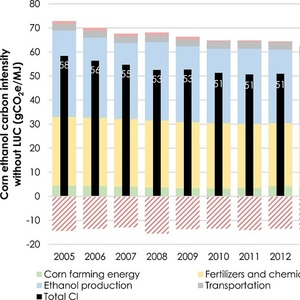CI of corn ethanol down 23% with additional reductions possible

SOURCE: Biofuels Bioproducts and Biorefining
May 5, 2021
BY Erin Krueger
Researchers from Argonne National Laboratory on May 4 published the results of a new study that shows the carbon intensity (CI) of corn ethanol decreased 23 percent from 2005 to 2019, from 58 to 45 grams of carbon dioxide equivalent per megajoule (gCO2e/MJ).
“Our study shows that while the corn ethanol industry has experienced significant volume expansion, it has reduced the GHG intensity of corn ethanol through improved U.S. corn farming and ethanol biorefinery operations,” the researchers wrote.
The research team cited several factors as contributing the lower CI score, including a 15 percent increase in corn grain yields despite consistent levels of fertilizer inputs; a 6.5 percent increase in ethanol yields; and a 24 percent reduction in ethanol plant energy use.
Advertisement
Advertisement
“The total [greenhouse gas (GHG)] emission reduction benefits through the reduction in the CI and increased ethanol production volume are estimated at 140 million metric tons (MMT) from 2005 to 2019 in the ethanol industry,” the researchers wrote. “Displacement of petroleum gasoline by corn ethanol in the transportation fuel market resulted in a total GHG emission reduction benefit of 544 MMT CO2e during the period 2005 to 2019.”
The study also notes that additional measures can help further reduce the GHG emissions associated with corn ethanol in the future. “In the farming stage, sustainable farming practices such as noâ€�till and cover crops can help reduce fertilizer inputs and increase soil organic carbon content,” the researchers wrote. “In ethanol biorefineries, fermentation CO2 can be captured and sequestered, and fossil natural gas can be replaced with renewable natural gas and biomass gasification. Biofuels, including corn ethanol, can play a critical role in the U.S. desire for deep deâ€�carbonization of its economy.”
The American Coalition for Ethanol has spoken out to commend the study. “ACE commends the scientists who contributed to this important research regarding the low carbon benefits of corn ethanol,” said Brian Jennings, CEO of ACE. “The evidence is mounting that agriculture and ethanol can and should be part of the solution to significantly reduce GHG emissions, both in the immediate future and long term.
“When modelers provide credit for soil carbon sequestration, corn ethanol will approach net-negative emissions territory,” he added. “Further, with the adoption of carbon capture and sequestration, ethanol will be the only transportation energy source that can credibly say it has the ability to reach net-negative carbon intensity in the future.”
Advertisement
Advertisement
The Renewable Fuels Association is also applauding the results of the study. “This new study from the experts at Argonne National Laboratory adds to a growing body of scientific evidence that proves today’s corn ethanol is playing a major role in decarbonizing our nation’s transportation fuels and combatting climate change,” said Geoff Cooper, president and CEO of the RFA. “The researchers found that modern corn ethanol cuts GHG emissions by half compared to gasoline and underscored that the contribution of land-use change to total emissions is estimated to be relatively small, based on real-world experience and empirical data, compared to the levels that had been theorized toward the beginning of the timeframe examined. Continuous improvements in farming and biofuel production technology have helped establish ethanol as a true low-carbon fuel that is available here and now to clean up our nation’s liquid fuels. And, as acknowledged by these researchers, those improvements will continue; with the adoption of new and emerging technologies, we expect corn ethanol can be a net carbon-neutral or carbon-negative fuel by the end of this decade.
“We encourage the White House and Environmental Protection Agency to consider the findings of this study as they examine policy and regulatory opportunities for reducing carbon pollution,” he added. “We also urge EPA to incorporate the Argonne results and other recent research as the agency considers updating its 12-year old GHG analysis of ethanol and other renewable fuels.”
A full copy of the study is available on the website of the academic journal Biofuels Bioproducts and Biorefining.
Related Stories
CountryMark on July 22 celebrated the completion of more than $100 million in upgrades at its refinery in Indiana, including those related to soybean oil storage. The facility produces renewable diesel via coprocessing technology.
ATOBA Energy and Air Moana are partnering to implement scalable solutions for the supply of SAF. The collaboration aims to ensure long-term SAF availability while supporting local initiatives to develop sustainable fuel production in Tahiti.
While final IRS guidance is still pending, the foundation of the 45Z program is well defined. Clean fuel producers should no longer be waiting; they can now move forward with critical planning and preparation, according to EcoEngineers.
Neste Corp. on July 24 released second quarter results, reporting record quarterly renewable product sales volumes despite weaker margins. SAF sales were up nearly 80% when compared to the first quarter of 2025.
Valero Energy Corp. on July 24 released second quarter results, reporting a profitable three-month period for its ethanol segment. The renewable diesel segment posted a loss, but the company’s new sustainable aviation fuel (SAF) unit operated well.
Upcoming Events










